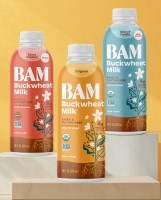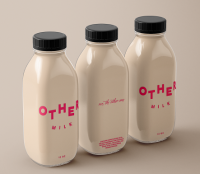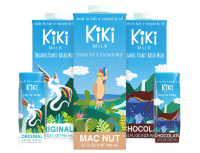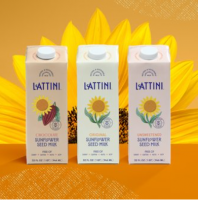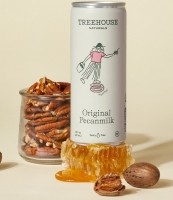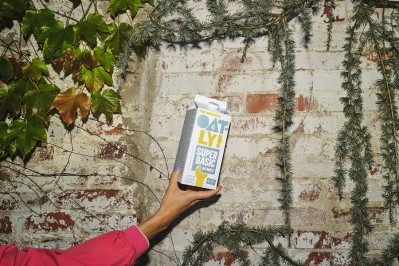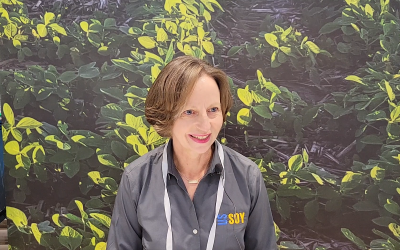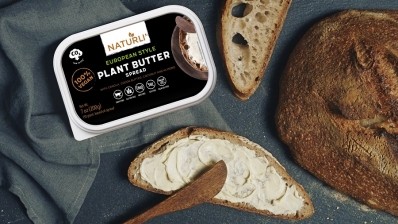Innovations in plant-based milk embrace clean-label, sustainability, enhanced taste
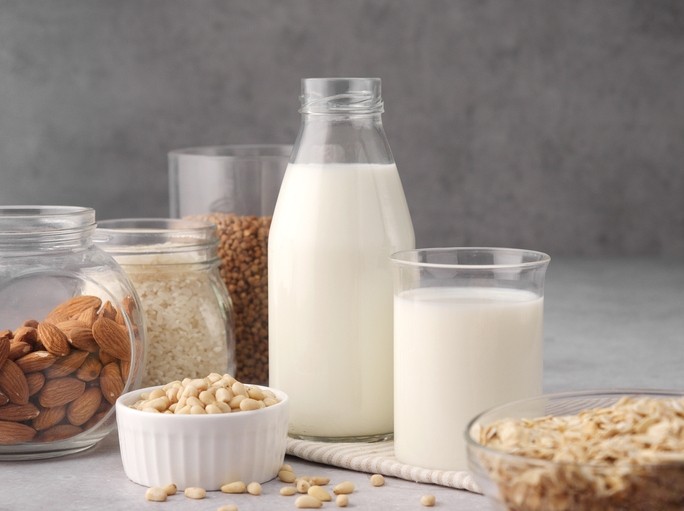
The US plant-based milk market is projected to generate $3.6bn in 2023 – up more than a billion dollars from before the pandemic in 2019 – and it shows no sign of slowing with predicted sales reaching $5.4bn in the next five years, according to Statista.
According to SPINS data, much of the recent growth comes from a double-digit increase in oat milk, dollar sales of which far outpaced any other major category with a 50.52% increase to $527.44m in the 52 weeks ending June 12, 2022. The second fastest growing segment was pea, and it came in at a distant increase of 27.37% to $60.13m in the same period.
Almond may not be growing as fast, indeed SPINS found dollar sales dipped 1.02% in the period, but it still held the lead with $1.277bn in sales in the year ending June 12, 2022.
As the category continues to grow, it is becoming increasingly fragmented as new players enter the market – bringing with them new consumers who are drawn to their different nutritional profiles, cleaner ingredient decks and environmental sustainability claims.
Wanted: Better nutrition and uncompromised taste
Many consumers are driven to plant-based milk because they struggle with lactose intolerance or want to manage other health concerns – from cardiovascular to dermatological – but as the team behind Hope and Sesame notes, not all plant-based milks are nutritionally equal.
“Most of the subcategories of plant-based milk are actually ‘trade-downs’ in nutrition versus dairy milk,” the team told FoodNavigator-USA, noting most almond milk has 1g or less of protein per serving versus 8g of complete protein in a serving of dairy milk.
“Knowing sesame’s strong nutritional benefits (rich in protein, calcium, vitamins and minerals) … our team began to ask ‘why’ there was no viable commercialized milk alternative using the crop,” the team explained in an email.
After five years “and approximately 20,000 development hours in the commercialization process, including research and development with top beverage scientists, flavorists, and even a Michelin star chef,” the Hope and Sesame team says it created a plant-based milk that is nutritionally comparable to dairy with 8g of complete protein.
BAM’s Extra Creamy Buckwheat Milk also touts comparable levels of complete protein to dairy milk thanks to the nutrient density of its base ingredient, which despite its name is a seed, not a wheat or even a grain, company founder Paige Hansen told FoodNavigator-USA.
“I’m not a fan of the word ‘superfood’ but buckwheat certainly could be described as one because it’s so nutrient dense,” Hansen said. “It’s a complete plant-based protein with all nine essential amino acids,” and when combined with a “a touch of organic coconut cream” it offers both “deliciously creamy mouthfeel” and 8g of protein.
Other SKUs in BAM’s line up offer at east 4g of complete protein per serving and 2g of sugar or less.
Consumers want less sugar, fillers and stabilizers
Hansen also eschews oils, gums and fillers in her products, which she describes as “100% clean” – another emerging trend among newcomers to the plant-based milk category.
“People are … becoming more aware of the high sugar content and other more inflammatory ingredients like canola oil, natural flavors and stabilizers,” that often are used in plant-based milks, and they are “demanding cleaner products for everyday use,” said Neka Pasquale, founder of Urban Remedy, which makes two cashew-based nut milks, four meal replacement shakes made with nut milk or almond butter, and cashew-milk based coffee and tea.
“Our products are created for people who are looking for nutrient dense products that are naturally lower inflammation and tastes amazing. Products that are minimally processed and made with the cleanest certified organic ingredients on Earth,” Pasquale said.
By diversifying the base ingredients used in non-dairy milk beyond classics like almond and soy, category newcomers are able to ditch added oils and gums that increasingly turn off consumers without forgoing the creaminess and mouthfeel many want from dairy alternatives, added Elizabeth Bounds, founder of Other Milk Company, which offers small-batch, locally made oat- and pecan-milk in seasonal flavors.
“One would think that without added oil/gums, the product would lose creaminess but we can actually achieve a similar product to a plant-based milk with fillers given the right amount of natural fats – pecans and hemp in particular contain a decent amount, which yields a creamy product,” she said.
Managing separation anxiety
Dropping stabilizers has a more noticeable impact on the plant-based milk experience as it can lead to separation, but Bounds says this is “not a bad thing,” it just requires intentional messaging.
“Any natural product without a stabilizer is going to separate. … There is so much misinformation around this. We’re working to educate our consumer base, though many come to us already knowing this. Consumers tend to be as informed as the producer these days – which is great,” she told FoodNavigator-USA.
Kiki Milk, which makes plant-based milks for children without gums, oils and fillers also struggles with separation, and like Other Milk Company educates consumers about the need to shake their products. But they also “add more food … and less water to achieve the creamy, milky flavor” consumers want, the team told FoodNavigator-USA.
“It led to a more expensive product in the end, but we feel that it’s a better product and it’s what the market is lacking and needs,” the team added in an email.
Curdling in hot beverages is another challenge that comes with removing gums and fillers, but for non-dairy milk brand Three Trees this was just another opportunity for innovation.
The company, which is rooted in the idea that the best food come directly from nature and considers leaving out gums and fillers a “non-negotiable,” recently launched at Sprouts a Barista SKU, which it says still uses 100% whole ingredients.
“It took a long time to get the formulation just right,” but “we’re super excited” about the Barista launch, said Three Trees sales analyst Audrey Koh.
She added the extra work and consumer education that come with formulating products with simpler ingredients is worth it because significant growth in the alt-milk category is coming from premium brands as consumers trade up for better-for-you products.
Consumers want more sustainable options
Consumers increasingly are drawn to plant-based milks not only because they want products that they perceive as healthier for them, but also for the planet.
Environmental concerns were among the top reasons that Hansen created BAM – which stands for Because Agriculture Matters – and uses buckwheat as the base ingredient for the brand’s flagship product, which will launch this summer in Southern California.
“I selected buckwheat for its many personal and soil health benefits after a visit to my hometown of Fresno, Calif. Growing up in California’s agricultural heartland, I’ve always had an interest in how food is grown and a respect for those who grow what we eat. Buckwheat is a climate-smart, inherently regenerative, pollinator-friendly crop. It's typically used as a cover crop and can grow on depleted soil and make that soil healthier,” she told FoodNavigator-USA.
She added, “One farmer who grows buckwheat told me it is America's orphan crop, it has so much potential to improve our soil and help with climate-change and it is an excellent food source, but is underutilized. That stuck with me. My goal is to champion lesser known, climate-smart and regenerative crops like buckwheat by using them in popular food and beverage products.”
Hazelicious, Lattini Sunflower Milk offer lower-water options than almond milk
Creating a more sustainable milk-alternative also was behind the creation of Hazelicious, which uses hazelnuts sourced from the Black Sea Coast of Turkey which are all rain-fed – using no or little additional water, said company founder and CEO Levent Tuysuzoglu.
“We think that’s a refreshing contrast to the almond industry, which is dominated by big agriculture and consumes upwards of 100 gallons of water to product just one quart of milk,” he told FoodNavigator-USA.
Lattini Sunflower Milk was founded on a similar premise – to create a plant-based alternative that was sustainable without sacrificing taste and nutrition, company co-founder and CEO Nicholas Romano said.
He explained to FoodNavigator-USA, “Sunflowers are drought tolerant and grown under dryland farming practices using 40% less water than almonds. They are also friendly to pollinators like bees and help attract pollinators to help farms and gardens flourish. They have a deep taproot that helps break up soil layers and allows good bacteria in to help rejuvenate the soil. This root system coupled with no-till farming also allows carbon to stay deep in the ground, offering a lower carbon footprint than other plant-based alternatives.”
He added Lattini is working with local farmers to incorporate sunflowers into their regenerative farming practices, specifically in areas with low precipitation, such as northern Texas and the Dakotas.
Kiki Milk also touts its sustainability credentials, telling FoodNavigator-USA that its total carbon footprint of 0.10 kg CO2e is about 45% less than most dairy milks.
Plant-based milk maker Treehouse Naturals also recently expanded with a line of canned pecanmilks, which it touts as “one of the most environmentally sustainable nuts (especially when compared to water-thirsty almonds).”
It also recently switched from reusable glass jar to aluminum cans to better “meet this moment of climate uncertainty with the most sustainable option out there,” according to a press release.
